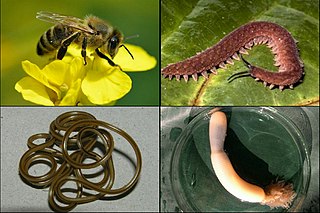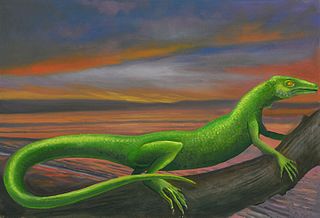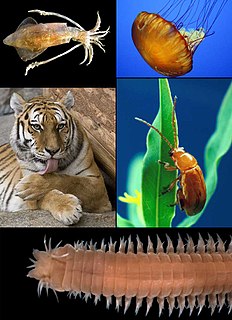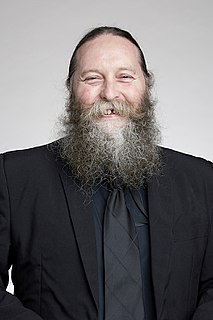Related Research Articles

Ecdysozoa is a group of protostome animals, including Arthropoda, Nematoda, and several smaller phyla. They were first defined by Aguinaldo et al. in 1997, based mainly on phylogenetic trees constructed using 18S ribosomal RNA genes. A large study in 2008 by Dunn et al. strongly supported the Ecdysozoa as a clade, that is, a group consisting of a common ancestor and all its descendants.

Savant syndrome is a rare condition in which someone with significant mental disabilities demonstrates certain abilities far in excess of average. The skills that savants excel at are generally related to memory. This may include rapid calculation, artistic ability, map making, or musical ability. Usually, only one exceptional skill is present.
The DAF-2 gene encodes for the insulin-like growth factor 1 (IGF-1) receptor in the worm Caenorhabditis elegans. DAF-2 is part of the first metabolic pathway discovered to regulate the rate of aging. DAF-2 is also known to regulate reproductive development, resistance to oxidative stress, thermotolerance, resistance to hypoxia, and resistance to bacterial pathogens. Mutations in DAF-2 have been shown by Cynthia Kenyon to double the lifespan of the worms. In a 2007 episode of WNYC’s Radiolab, Kenyon called DAF-2 "the grim reaper gene.”
Timothy John Mitchison is a cell biologist and systems biologist and Hasib Sabbagh Professor of Systems Biology at Harvard Medical School in the United States. He is known for his discovery, with Marc Kirschner, of dynamic instability in microtubules, for studies of the mechanism of cell division, and for contributions to chemical biology.

John Richard Krebs, Baron Krebs, FRS is an English zoologist researching in the field of behavioural ecology of birds. He was the Principal of Jesus College, Oxford from 2005 until 2015. Lord Krebs was President of the British Science Association for the period 2012–2013.

Torkel Weis-Fogh was a Danish zoologist and Professor at the University of Cambridge and the University of Copenhagen. He is best known for his contributions to the understanding of insect flight, especially the clap and fling mechanism used by very small insects. James Lighthill named this "the Weis-Fogh mechanism of lift generation".

Thadeosaurus is an extinct genus of diapsid reptile belonging to the family Younginidae. Fossils have been found in the Lower Sakamena Formation of the Morondava Basin, Madagascar in 1981, and date to the late Permian to the early Triassic period.
Sir Roy Malcolm Anderson is a leading international authority on the epidemiology and control of infectious diseases. He is the author, with Robert May, of the most highly cited book in this field, entitled Infectious Diseases of Humans: Dynamics and Control. His early work was on the population ecology of infectious agents before focusing on the epidemiology and control of human infections. His published research includes studies of the major viral, bacterial and parasitic infections of humans, wildlife and livestock. This has included major studies on HIV, SARS, foot and mouth disease, bovine tuberculosis, bovine spongiform encephalopathy, influenza A, antibiotic resistant bacteria, the neglected tropical diseases and most recently COVID-19. Anderson is the author of over 650 peer-reviewed scientific articles with an h citation index of 125.

Philosophical Transactions of the Royal Society B: Biological Sciences is a biweekly peer-reviewed scientific journal published by the Royal Society. The editor-in-chief is John Pickett.

Planulozoa is a proposed basal ParaHoxozoa clade, sometimes as sister of the Placozoa, but originally included Placozoa. In the latter case Planulozoa may be a senior synonym to Parahoxozoa. It contains the Cnidaria and the Bilateria. The Placozoa may be a sister of Cnidaria or more conventionally of Planulozoa. The clade excludes basal animals such as the Ctenophora, and Porifera (sponges).

The Spiralia are a morphologically diverse clade of protostome animals, including within their number the molluscs, annelids, platyhelminths and other taxa. The term Spiralia is applied to those phyla that exhibit canonical spiral cleavage, a pattern of early development found in most members of the Lophotrochozoa.
Sarah Brosnan is a researcher studying the development of cognitive processes that underlie cooperation and reciprocity. The focus of her work has been on how animals perceive "exchanged goods and services," as demonstrated by reciprocal interactions,. She has looked at both human and nonhuman primates as a way of understanding the evolution of cooperative and economic behaviors, specifically the topic of inequity aversion and the cooperative pulling paradigm. She works at Georgia State University in the Department of Psychology, and directs the university's Comparative Economics and Behavioral Studies Laboratory.

Cecilia Heyes is a British psychologist who studies the evolution of the human mind. She is a Senior Research Fellow in Theoretical Life Sciences at All Souls College, and a Professor of Psychology at the University of Oxford. She is also a Fellow of the British Academy, and President of the Experimental Psychology Society.
David Andrew Whiten, known as Andrew Whiten is a British zoologist and psychologist, Professor of Evolutionary and Developmental Psychology, and Professor Wardlaw Emeritus at University of St Andrews in Scotland. He is known for his research in social cognition, specifically on social learning, tradition and the evolution of culture, social Machiavellian intelligence, autism and imitation, as well as the behavioral ecology of sociality. In 1996, Whiten and his colleagues invented an artificial fruit that allowed to study learning in apes and humans.

Sarah Cleaveland is a veterinary surgeon and Professor of Comparative Epidemiology at the University of Glasgow.

Pete Smith is Professor of Soils and Global change at the University of Aberdeen where he directs the Scottish Climate Change Centre of Expertise, ClimateXChange.

John Allen is a British biochemist. He is an honorary professor at the Department of Genetics, Evolution and Environment at the University College London in the United Kingdom.
Mark Edward John Woolhouse FRSE FMedSci OBE is professor of infectious disease epidemiology at the Usher Institute in the College of Medicine and Veterinary Medicine at the University of Edinburgh.
Cytochrome P450, family 74, also known as CYP74, is a cytochrome P450 family in land plant supposed to derived from horizontal gene transfer of marine animal CYPs.
Pathogen avoidance, also referred to as, parasite avoidance or pathogen disgust, refers to the theory that the disgust response, in humans, is an adaptive system that guides behavior to avoid infection caused by parasites such as viruses, bacteria, fungi, protozoa, helminth worms, arthropods and social parasites. Pathogen avoidance is a psychological mechanism associated with the behavioral immune system. Pathogen avoidance has been discussed as one of the three domains of disgust which also include sexual and moral disgust.
References
- ↑ Woods, Abigail (12 July 2011). "A historical synopsis of farm animal disease and public policy in twentieth century Britain". Philosophical Transactions of the Royal Society of London B. 366 (1573): 1943–54. doi:10.1098/rstb.2010.0388. PMC 3130385 . PMID 21624915.
- ↑ Enticott, G; Donaldson, A; Lowe, P; Power, M; Proctor, A; Wilkinson, K (12 July 2011). "The changing role of veterinary expertise in the food chain". Philosophical Transactions of the Royal Society of London B. 366 (1573): 1955–65. doi:10.1098/rstb.2010.0408. PMC 3130392 . PMID 21624916.
- ↑ "State Veterinary Service to become Animal Health". www.vetclick.com. 27 March 2007. Retrieved 2018-01-09.